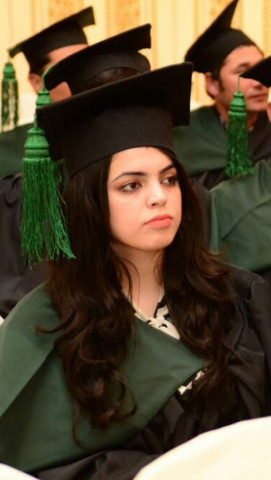Afghan woman living in Pakistan dreams of becoming dental surgeon
Tamanna Amin, an Afghan refugee, has appealed to social welfare organisations for assistance

Tamanna Amin received a 4.0 GPA when her result was declared this March. PHOTO COURTESY: Tamanna Amin
She had been a brilliant student since school and soon enough was acing all her classes in college. The 23-year-old recently completed her last semester notching the top slot in her class at the Hafeez Institute of Medical Sciences in Peshawar. She received a 4.0 GPA when her result was declared this March.
Amin dreams of becoming a dental surgeon so that she can help the people of war-ravaged Afghanistan, but lacks the financial resources to continue studying and pursue a doctorate in dental surgery.
Plight of Afghan refugees
In Urdu, Tamanna means desire and Amin says that since she cannot afford to study further, her desire to serve her people can only be fulfilled with the help of non-profit or social welfare organisations willing to bear the cost of further education and help her succeed.
“I was the only female student in my [BSc] class and was hesitant about competing with my male classmates. But I worked hard and got the highest marks,” says Amin. “I believe I can do even better in the future.”
Amin and her family have seen tough times as refugees having to settle in a foreign land but those hardships have not dimmed her spirit. The family migrated to Pakistan in 1992 from Wardak province in Afghanistan and rented a room in Hayatabad, Peshawar. But tragedy struck in 2007 when Tamanna’s father died and she and her four siblings were still young. To keep the family afloat, she began working at a dental clinic in 2011 which she continued alongside her studies. Amin is the sole earner in the house.
Government resumes scholarship programme for Afghan students
Despite financial hardship and social constraints, the importance of education was not lost on Amin’s mother Nooria Siddiqui who struggled to ensure her children were educated by taking up several jobs including, stitching clothes, teaching and working with an NGO.
Several schools even expelled the children because they were unable to pay the fees consistently, recalls Siddique, who herself is a social sciences graduate.
“I am very proud of her [Tamanna]. Because of her hard work, she always topped her classes and is now working to support the family,” she says.
Future in peril: For most Afghan refugees, school is not an option
Siddique did criticise welfare organisations saying several Afghan refugee families were living in miserable conditions in the country but these bodies did not offer help. According to her, the UN refugee agency UNHCR initially supports families but stops after some time and even visits to their offices are of no avail. She urged the agency to help families because they did not even have money to pay for healthcare.
Amin had to cover the cost for the first two years of BSc. In 2015, she found out about the UNHCR-administered German Academic Refugee Initiative scholarship and applied for it. The scholarship funded the rest of her degree easing the family’s financial burden.
She is now working on her final thesis towards the completion of the degree and is appealing to social welfare organisations to help her continue further studies so she can fulfil her dream of becoming a surgeon.



















COMMENTS
Comments are moderated and generally will be posted if they are on-topic and not abusive.
For more information, please see our Comments FAQ